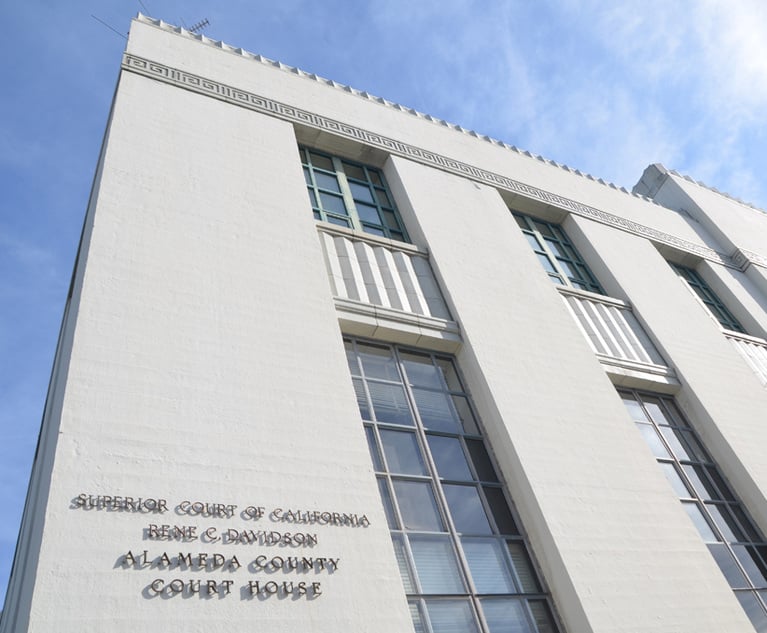Cross-Border Criminal Investigations Just Became More Complicated
The future of cross-border government enforcement investigations has been shaken by the U.S. Court of Appeals for the Second Circuit's recent decision in United States v. Allen, 864 F.3d 63 (2d Cir. 2017), which held that the Fifth Amendment's prohibition on the use of compelled testimony in criminal proceedings applies even when that testimony was compelled by a foreign official in a foreign investigation. Allen's ramifications are far-reaching and may put pressure on other circuits, including the Ninth, to embrace the holding or disavow it.
September 07, 2017 at 08:14 AM
6 minute read
The future of cross-border government enforcement investigations has been shaken by the U.S. Court of Appeals for the Second Circuit's recent decision in United States v. Allen, 864 F.3d 63 (2d Cir. 2017), which held that the Fifth Amendment's prohibition on the use of compelled testimony in criminal proceedings applies even when that testimony was compelled by a foreign official in a foreign investigation. Allen's ramifications are far-reaching and may put pressure on other circuits, including the Ninth, to embrace the holding or disavow it.
The Libor Investigation and 'Allen'
During late 2011 and 2012, the U.S. Department of Justice and numerous other government authorities, including the U.K.'s Financial Conduct Authority, were investigating the rigging of the London Interbank Offered Rate, in what became known as the Libor scandal. As a part of its investigation, the FCA obtained testimony from three British traders: Anthony Allen, Anthony Conti and Paul Robson. Their testimony was considered compelled because the traders faced criminal penalties under U.K. law if they had refused to testify. The FCA eventually brought an enforcement action against Robson, as part of which it disclosed the testimony of Allen and Conti.
This content has been archived. It is available through our partners, LexisNexis® and Bloomberg Law.
To view this content, please continue to their sites.
Not a Lexis Subscriber?
Subscribe Now
Not a Bloomberg Law Subscriber?
Subscribe Now
NOT FOR REPRINT
© 2025 ALM Global, LLC, All Rights Reserved. Request academic re-use from www.copyright.com. All other uses, submit a request to [email protected]. For more information visit Asset & Logo Licensing.
You Might Like
View All
Two More Victims Alleged in New Sean Combs Sex Trafficking Indictment


'It's a Matter of Life and Death:' Ailing Harvey Weinstein Urges Judge to Move Up Retrial

Invoking Trump, AG Bonta Reminds Lawyers of Duties to Noncitizens in Plea Dealing
4 minute readTrending Stories
- 1The End of Innocence? DEP’s End Run Around ‘All Appropriate Inquiry’ Spill Act Protections
- 2Pistachio Giant Wonderful Files Trademark Suit Against Canadian Maker of Wonderspread
- 3New York State Authorizes Stand-Alone Business Interruption Insurance Policies
- 4Buyer Beware: Continuity of Coverage in Legal Malpractice Insurance
- 5‘Listen, Listen, Listen’: Some Practice Tips From Judges in the Oakland Federal Courthouse
Who Got The Work
J. Brugh Lower of Gibbons has entered an appearance for industrial equipment supplier Devco Corporation in a pending trademark infringement lawsuit. The suit, accusing the defendant of selling knock-off Graco products, was filed Dec. 18 in New Jersey District Court by Rivkin Radler on behalf of Graco Inc. and Graco Minnesota. The case, assigned to U.S. District Judge Zahid N. Quraishi, is 3:24-cv-11294, Graco Inc. et al v. Devco Corporation.
Who Got The Work
Rebecca Maller-Stein and Kent A. Yalowitz of Arnold & Porter Kaye Scholer have entered their appearances for Hanaco Venture Capital and its executives, Lior Prosor and David Frankel, in a pending securities lawsuit. The action, filed on Dec. 24 in New York Southern District Court by Zell, Aron & Co. on behalf of Goldeneye Advisors, accuses the defendants of negligently and fraudulently managing the plaintiff's $1 million investment. The case, assigned to U.S. District Judge Vernon S. Broderick, is 1:24-cv-09918, Goldeneye Advisors, LLC v. Hanaco Venture Capital, Ltd. et al.
Who Got The Work
Attorneys from A&O Shearman has stepped in as defense counsel for Toronto-Dominion Bank and other defendants in a pending securities class action. The suit, filed Dec. 11 in New York Southern District Court by Bleichmar Fonti & Auld, accuses the defendants of concealing the bank's 'pervasive' deficiencies in regards to its compliance with the Bank Secrecy Act and the quality of its anti-money laundering controls. The case, assigned to U.S. District Judge Arun Subramanian, is 1:24-cv-09445, Gonzalez v. The Toronto-Dominion Bank et al.
Who Got The Work
Crown Castle International, a Pennsylvania company providing shared communications infrastructure, has turned to Luke D. Wolf of Gordon Rees Scully Mansukhani to fend off a pending breach-of-contract lawsuit. The court action, filed Nov. 25 in Michigan Eastern District Court by Hooper Hathaway PC on behalf of The Town Residences LLC, accuses Crown Castle of failing to transfer approximately $30,000 in utility payments from T-Mobile in breach of a roof-top lease and assignment agreement. The case, assigned to U.S. District Judge Susan K. Declercq, is 2:24-cv-13131, The Town Residences LLC v. T-Mobile US, Inc. et al.
Who Got The Work
Wilfred P. Coronato and Daniel M. Schwartz of McCarter & English have stepped in as defense counsel to Electrolux Home Products Inc. in a pending product liability lawsuit. The court action, filed Nov. 26 in New York Eastern District Court by Poulos Lopiccolo PC and Nagel Rice LLP on behalf of David Stern, alleges that the defendant's refrigerators’ drawers and shelving repeatedly break and fall apart within months after purchase. The case, assigned to U.S. District Judge Joan M. Azrack, is 2:24-cv-08204, Stern v. Electrolux Home Products, Inc.
Featured Firms
Law Offices of Gary Martin Hays & Associates, P.C.
(470) 294-1674
Law Offices of Mark E. Salomone
(857) 444-6468
Smith & Hassler
(713) 739-1250






